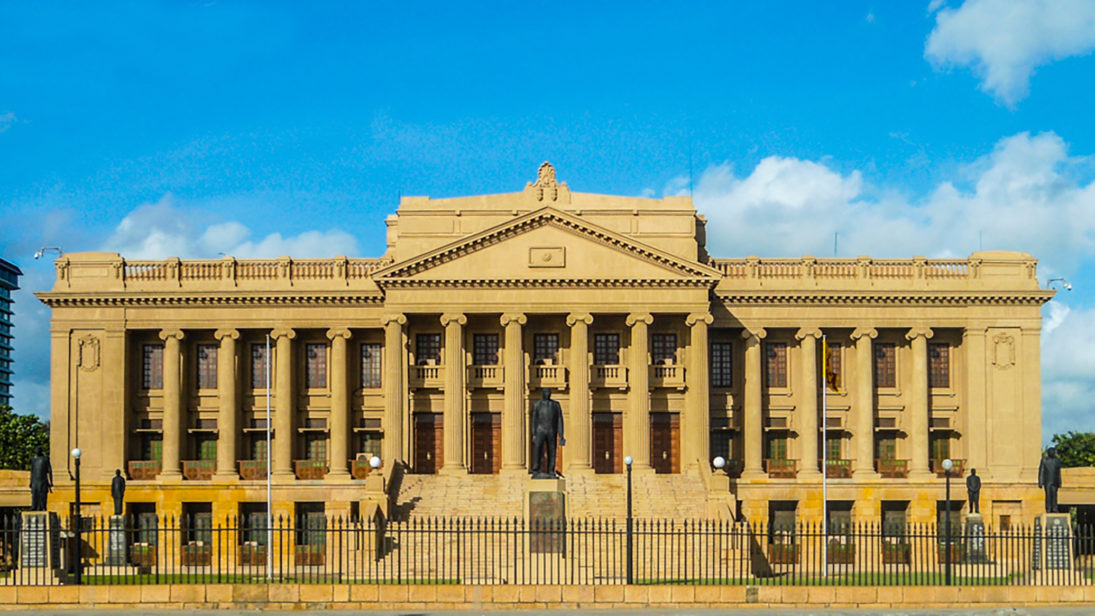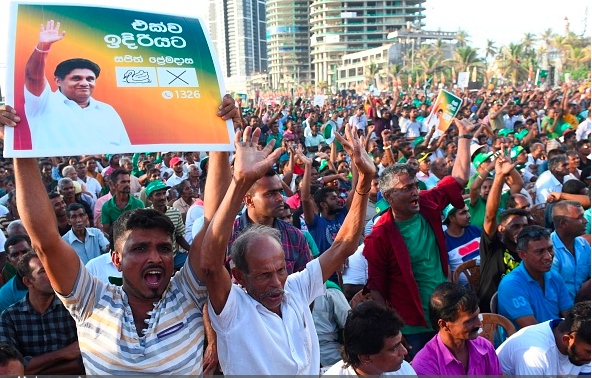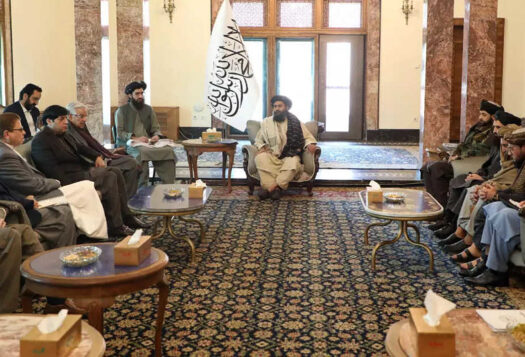
On November 16, around 16 million eligible Sri Lankan voters return to the polls after four years to cast their ballots to elect a new president. This election is historic because it marks the first time that the incumbent president, prime minister, and leader of the opposition are not contesting for the Office of the Head of State, Executive, and Government. The Easter suicide bombings this year and the ethnic discord between the majority and minority populations that followed have cast these elections in a particularly poignant light. While these tensions could collectively incite electoral violence and breed further instability, shifting demographics trend towards younger voters who define themselves less by ethnic allegiance and rally behind a reformist platform. Sri Lanka’s election will thus prove to be a crucial one, and key policy issues, including national security, economic recovery, and each candidate’s foreign policy stances, are likely to determine the electoral outcome.
The Candidates
Sri Lanka’s election will prove to be a crucial one, and key policy issues, including national security, economic recovery, and each candidate’s foreign policy stances, are likely to determine the electoral outcome.
The election will feature a handful of candidates from the political establishment, including the two leading presidential nominees. Gotabaya Rajapaksa, former defense secretary during his brother Mahinda Rajapaksa’s tenure as president, is the candidate put forward by one of the main political parties in the country– the Sri Lanka Podujana Peramuna (SLPP). The SLPP is the new form of the Our Sri Lankan Freedom Front Party, which rebranded itself in 2016 and experienced a landslide victory in the 2018 local elections. Its popular appeal mainly stems from party leader Mahinda Rajapaksa, the center-left former president who commanded national sentiment when he brought an end to the Sri Lankan government’s almost 30-year war with the Liberation Tigers of Tamil Eelam.
On the other side of the political spectrum, candidate Sajith Premadasa hopes to capitalize on his legacy as the son of former President Ranasinghe Premadasa by representing the New Democratic Front – a coalition led by the United National Party (UNP), which has traditionally been known for its neoliberal economic policies combined with pro-western liberal values. The young Premadasa has himself been a prominent figure in the political establishment and has demonstrated his philosophy of welfare economics and liberalism as the Minister for Housing under the current government.

Political Demography and the Domestic Political Climate
Sri Lanka’s shifting demographics are likely to play a central role in determining the election outcome. Sri Lankan politics is highly polarized; the more ethno-nationalist Sinhalese voters support the SLPP’s agenda while the UNP’s voter base includes the minority Muslim and Tamil communities. But the increasing number of swing voters are likely to be the deciders of this contest.
Swing voters are generally significantly younger than their partisan counterparts, unfettered by the war-era mindset, and hungry for accountable and transparent political reform in the country. In the 2015 presidential election, swing voters represented 13-15 percent of the population and this number is likely to increase in the forthcoming election.
In terms of issues, swing voters are especially concerned about the lack of campaign finance laws and regulation in the country, which has significantly reduced the transparency of the election process. In the absence of regulation, foreign intervention in Sri Lanka’s electoral process—including through illicit campaign financing or endorsement by countries who are seen as having a vested interest in the next president—becomes a significant threat. This is a key issue in the upcoming election. Additionally, corruption and special interests can disenfranchise young voters. Thus, mitigating corruption and the misappropriation of state resources are also likely to be issues on the ballot. Other domestic issues likely to influence the election outcome include economic ones such as employment and boosting foreign direct investment, as well as producing legislation protecting the country’s ethnic and religious communities.
These shifting demographics, identity politics, and domestic concerns also play into Sri Lanka’s electoral system. This election will bear witness to a record 35 candidates contesting for the presidency, which experts predict may impede the main candidates from attaining the fifty percent plus one vote needed for an outright victory. This would trigger Sri Lanka’s preferential voting system, which has been a long-standing feature of the country’s voting procedure since its introduction in 1978. If this happens, it would be the first time in the island’s history where an instant run-off the two candidates pulling the highest number of votes yet unable to garner the majority—could determine the electoral outcome.
There is a general lack of knowledge in the country about preferential voting as it has seldom featured in presidential elections. Thus, if the outcome is disputed, it could engender post-election violence. Mounting tensions between the Sinhalese majority and Muslim minority population after the Easter bombings in April and the anti-Muslim riots that followed have already incubated a delicate security situation in the country and may also cause election violence to break out.
Foreign Policy Issues Take Center Stage
Mounting tensions between the Sinhalese majority and Muslim minority population after the Easter bombings in April and the anti-Muslim riots that followed have already incubated a delicate security situation in the country and may also cause election violence to break out.
Though Sri Lanka is a member of the Non-Aligned Movement, it commands intrinsic international influence as a result of its strategically-advantageous location. In recent years, it has also forged closer ties with China, India, and the United States, partially through signing defense and trade agreements. Thus, the foreign policy ethos of the Eighth Executive President will prove to be the crucial bedrock for the future trajectory of the country and its national sovereignty.
Here, we must consider two scenarios. First, if Sajith Premadasa is elected president, he would likely expand individual freedoms, democracy, and liberal norms, including socio-economic reforms as well as move towards a closer relationship with big-brother India. The presidential-hopeful has attributed the success of the “model village” housing construction program, implemented under his guidance, to a USD $6.6 million concessionary loan from the Indian government.
In stark contrast, if Gotabaya Rajapaksa secures the presidency, China will have a more protracted role in the country. As in the past, the Rajapaksa family was known to benefit from the Chinese model of extending aid through infrastructure development and concessionary loans. Political aides of the Gotabaya Rajapaksa camp say that he plans to “restore relations” with China if he becomes the presidential victor. Gotabaya Rajapaksa will also likely adopt his brother’s inward state-policy of robust nationalism.
Election Outcome and Charting a Future Trajectory
A key question tied to the outcome of this election is whether Sri Lanka can uphold its democratic traditions and institutions. For instance, there are concerns that the two main candidates could use the recently-enacted constitutional reform of the 19th Amendment to devolve some presidential power to bolster the Office of the Prime Minister instead. If such backdoor deals have been cut and the SLPP were to secure victory in the election, it could open the door to party leader Mahinda Rajapaksa returning to the executive in the empowered position of prime minister. Similarly, if the UNP-led coalition secures victory, Ranil Wickremesinghe could resurrect his current position as prime minister. If the latter scenario were to occur, then this might be more favorable to Western interests in sustaining the status quo of Sri Lanka as an internationally favorable nation. However, if the Rajapaksa clan were to return to power, it might spark fears of authoritarianism.
Within an impugnable political landscape—mired in potential constitutional and voting procedure loopholes and looming security threats in the form of communal violence and terrorism—it is likely that the masses will take to the polls to register their growing concerns. Given that the incumbent government has failed to safeguard the nation or provide accountability and trust to its constituents, the incoming president must endeavor to restore the sanctity of the government. At this juncture in its history, Sri Lanka rests on a needlepoint as it elects its new president and determines its standing in the new decade.
***
Image 1: Wikimedia Commons


